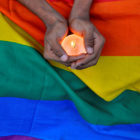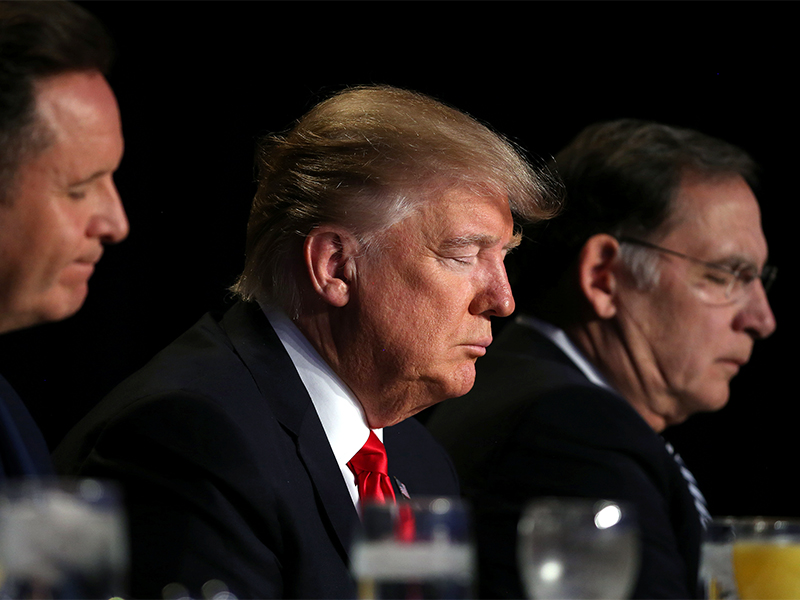
NEW YORK (RNS) Religious conservatives and Republican members of Congress are urging President Trump to issue a sweeping religious liberty executive order, which I believe is unnecessary and most likely would threaten the rights of LGBT persons.
As a Catholic priest and scholar, I know that religious liberty is a bedrock principle of democracy. I also believe that honoring the intrinsic human dignity of gay, lesbian and transgender people is a requirement of religious faith. These values should not and need not be pitted against each other.
RELATED: Republicans in Congress push Trump for religious liberty executive order
Religious liberty is essential for faith-based ministries. But it should never be a pretext or cause for discrimination against any group. Religious exemptions from civil laws should be carefully crafted to both accommodate religious claims of conscience and uphold the civil rights of all Americans.

President Trump prays during the National Prayer Breakfast event in Washington, D.C., on Feb. 2, 2017. Photo courtesy of Retuers/Carlos Barria
This is why leaked drafts of Trump’s executive order raise serious concerns. It fails to properly balance the dual goods of religious freedom and nondiscrimination. Its language will be read by many as a broad assault upon LGBT rights and a license to deny basic services to same-sex couples. When the government sends a message that people can be denied basic human rights and dignities simply because of sexual orientation, neither the gospel nor religious freedom is well served.
[ad number=“1”]
Despite the rhetoric of persecution embraced by some, Christians are not under attack in this country. In many places in our world, Christians suffer severe official restrictions on practicing their faith and even, at times, do so at the cost of their lives. That is not the case here. My fellow Catholics and I are free to worship and express our faith in the public square. Catholic hospitals, charities and universities, which serve millions of Americans regardless of faith, contribute to the common good in countless ways.
To use the language of “persecution” to justify far-reaching exemptions from public policies both trivializes the plight of believers who endure genuine threats and compromises our own faith commitment to the equal human dignity of all people.
[ad number=“2”]
Some might think it’s unusual for a Catholic priest to “defend LGBT rights.” But this way of phrasing the issue is misleading. “LGBT rights,” in the abstract sense, are not at stake here, but rather the human and civil rights of real people. At issue is not the protection of behaviors — about which there are sincere differences of belief within religious communities — but the welfare of fellow citizens and believers, human beings and families who are loved by God. This is why Pope Francis, while defending traditional Catholic teaching on marriage, has also called for a more inclusive welcome and embrace of LGBT persons. He even states that the church should ask forgiveness from gay people for the times Christians have excluded them or made them feel unwelcome through our practices and rhetoric.
Because of this papal encouragement, I and a growing number of Catholic leaders are trying to chart a better path forward.
[ad number=“3”]
Cardinal Blase Cupich of Chicago, reacting to the 2015 Supreme Court decision that legalized same-sex marriage, called for “mature and serene reflections as we move forward together” and cited the church’s teachings against discrimination. “This respect must be real, not rhetorical, and ever reflective of the Church’s commitment to accompany all people,” the archbishop said. Father James Martin, a prominent Jesuit priest recently appointed as a communications adviser to the Vatican, has a new book coming out later this spring that urges the Catholic Church to do a better job building bridges to the LGBT community. In a sign of shifting dynamics within the church’s senior leadership, the book has been endorsed by an American cardinal who leads a key Vatican office. On Friday (April 28), I will speak at a conference in Chicago, “LGBT Catholics in the Age of Pope Francis,” that will bring together theologians, church leaders and LGBT people to celebrate our common faith and to facilitate greater respect and understanding.
False choices lead to flawed decisions. We can protect both religious liberty and the civil rights of LGBT people. There will be candid debate over how to best balance these two values, but I believe that most Americans know that sensible common ground is possible. I pray that the Trump administration also heeds that lesson.
(The Rev. Bryan N. Massingale is a Catholic priest and a professor of theological and social ethics at Fordham University. He is a former president of the Catholic Theological Society of America)
